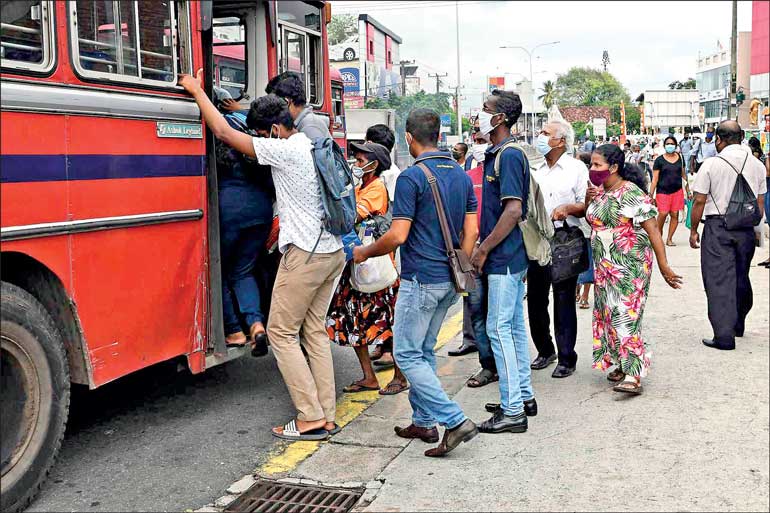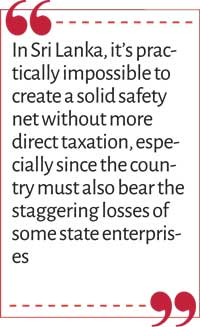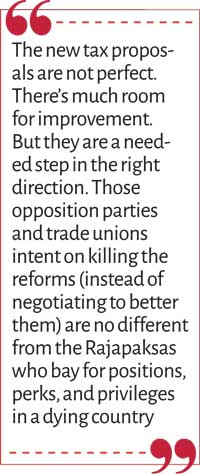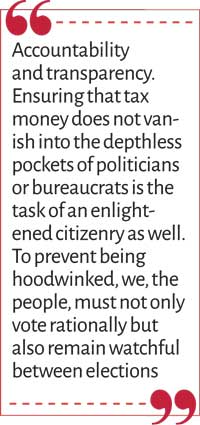Saturday Feb 14, 2026
Saturday Feb 14, 2026
Wednesday, 9 November 2022 00:10 - - {{hitsCtrl.values.hits}}

So here we are, bankrupt, cashless. No way out but taxation. The real question is not to tax or not, but who should bear the burden of new and increased taxes in real terms – Pic by Shehan Gunasekara
“Masons, when they start upon a building,
Are careful to test out the scaffolding...”
– Seamus Heaney (Scaffolding)
During the Trump presidency, asked whether his extremely popular wife will be the next Democratic nominee, Barack Obama would say that there were only three certitudes in life, death, taxes, and Michelle not contesting the presidency. Just as death is a fact of human condition, taxes, in some form or other, have been a fact of political condition. The first recorded tax goes as far back as 5,000 years to ancient Egypt, a levy on grain harvests paid in grain. The Caesars made full use of both income and wealth taxes. All those roads and aqueducts needed cash.
Barack Obama would say that there were only three certitudes in life, death, taxes, and Michelle not contesting the presidency. Just as death is a fact of human condition, taxes, in some form or other, have been a fact of political condition. The first recorded tax goes as far back as 5,000 years to ancient Egypt, a levy on grain harvests paid in grain. The Caesars made full use of both income and wealth taxes. All those roads and aqueducts needed cash.
Cash and its absence; the October report by the IFRC, based on a survey in 11 districts, identifies food insecurity, health, livelihoods, and nutrition as main concerns, followed by deteriorating physical safety and security and violence against women and children. People are “borrowing heavily, eating less food and fewer times per day, pawning valuables and assets,” and using “other survival strategies just to scrape by.” Life turned nasty, brutish, probably shorter, and definitely unbearable. For these vulnerable men, women, and children a more effective safety net is a matter of life and death, in the most literal sense.
Cash again. Of course, one could just print money. As the Rajapaksas did; more than 2 trillion rupees in two and a half years. Asked about it in August 2021, Ajith Nivard Cabraal, then state minister of Money, Capital Markets, and Public Enterprise Reform, called it a ‘drastic treatment’ to a ‘major illness’ (a major illness caused by 2019 Rajapaksa tax cut with an estimated loss around Rs. 700 billion). Cabraal (who would soon become the governor of the Central Bank having changed the law to give himself cabinet status and a hefty pension), said the US printed money, so can we. Since the American dollar happens to be the international reserve currency, that ‘reasoning’ would be as deadly as dashing off to climb Everest in the same clothes one wore to climb Pidurutalagala because both are ‘tallest mountains’.
In the same Daily Mirror interview, Cabraal airily dismissed inflation concerns and assured there was no ‘alarming foreign exchange crisis’. “The torturers sleep soundly,” wrote, Zbigniew Herbert. So do fools.
foreign exchange crisis’. “The torturers sleep soundly,” wrote, Zbigniew Herbert. So do fools.
So here we are, bankrupt, cashless. No way out but taxation. The real question is not to tax or not, but who should bear the burden of new and increased taxes in real terms.
Commitment to Equity Assessment (CEQ) is aimed at analysing the impact of taxation and social spending on inequality and poverty in individual countries. According to The Commitment to Equity Handbook (edited by Prof. Nora Lustig, a pioneer in this field), in Sri Lanka, even the moderately poor (those who belong to the income category of 2.50 to 4 US dollars a day in purchasing power parity) are net payers to the fiscal system. In other words, the moderately poor pay more in terms of indirect taxes than they receive in terms of transfers, subsidies and other benefits.
According to the working paper, The Incidence of Taxes and Spending in Sri Lanka by Nisha Arunatilake, Gabriela Inchauste, and Nora Lustig, “...despite the improvement in the poverty headcount with the intervention of fiscal policy, as much as 8 percent of households that were above the US$2.50-a-day poverty line before fiscal intervention became poor in cash terms. This is because the benefits delivered through direct transfers and indirect subsidies are not enough to compensate for indirect taxes being paid by these households.” The paper finds that direct taxes are progressive and equalising while the VAT raises “PPP poverty headcount rate by 2 percent.” The research was done in 2010, before the 2019 tax cuts, and before the current calamity. The present picture has to be infinitely worse.
The travesty of the latest social security levy provides a salutary lesson. The CEB is passing the tax wholesale onto consumers, adding 2.5% to an already hiked electricity bill. For many vulnerable families, this would mean inability to pay, and the consequent loss of electricity. Incidentally, the CEB unions are silent about the matter; they probably insist on the transfer, rather than lose even an iota of their unearned privileges, like the political class.
onto consumers, adding 2.5% to an already hiked electricity bill. For many vulnerable families, this would mean inability to pay, and the consequent loss of electricity. Incidentally, the CEB unions are silent about the matter; they probably insist on the transfer, rather than lose even an iota of their unearned privileges, like the political class.
The new tax proposals are not perfect. There’s much room for improvement. But they are a needed step in the right direction. Those opposition parties and trade unions intent on killing the reforms (instead of negotiating to better them) are no different from the Rajapaksas who bay for positions, perks, and privileges in a dying country.
The world and us
In his Capital and Ideology, Thomas Picketty places taxation at the centre of the West’s historical emergence as global powers. Using extensive data, he argues that a position of parity between Eastern and Western powers prevailed by the end of the 15th century. Leading Western nations took their first leap forward between 1500 and 1800, powered by an increase in tax revenues from 1 to 2% of national income to 6 to 8%. The second leap happened between 1930 and 1980 (despite the devastation of the Second World War) enabled by tax revenue increases from 8-10% to 30 to 35%. In this second period, revenue increases were driven by direct taxes and led to “economic development and historic improvement in living standards.” Chinese and Ottoman empires failed to keep pace with their Western rivals because their tax revenues remained low. Japan escaped the stagnation trap with the Meiji reforms, with taxation (including direct taxes) as a major pillar.
The story of Finland’s transformation from one of the poorest countries in Europe to one of the richest in the world in half a century, without colonies or oil is an interesting one. Having collaborated with Nazi Germany, Finland ended the war on the losing side, lost 10% of her territory, suffered severe economic devastation, and was saddled with a hefty reparation bill. Unwilling to antagonise the Soviet Union, Finland didn’t take part in the Marshall Programme either.
Within a dozen years from that nadir, Finland had made the turn, according to a paper published in 1960. “Many serious problems remain but they are very different from the stark issues of survival. Currently the central economic problems are how to share the national income and how to control inflation and not the life and death of the nation.” Fiscal consolidation played a key role, especially in laying the groundwork of free education and health systems that are among the best in the world today. And in the crucial early years, from 1945 to 1951, about one third of revenue came from income and wealth taxes. (https://helda.helsinki.fi/bitstream/handle/10224/3553/pihkala26-47.pdf?sequence=1)
economic problems are how to share the national income and how to control inflation and not the life and death of the nation.” Fiscal consolidation played a key role, especially in laying the groundwork of free education and health systems that are among the best in the world today. And in the crucial early years, from 1945 to 1951, about one third of revenue came from income and wealth taxes. (https://helda.helsinki.fi/bitstream/handle/10224/3553/pihkala26-47.pdf?sequence=1)
As Ilan Goldfajn, Western Hemisphere Director of the IMF pointed out during a recent Civil Society Policy forum, Winds of Change: The Future of Tax Reform in Latin America, “If we want to be sustainable, in fiscal terms, we also need to be socially sustainable. So both need to happen at the same time. Policymakers must recognise public frustration with inequality, especially post-pandemic and with rising inflation... Tax reform can only work if it is socially and politically sustainable.” In Sri Lanka, it’s practically impossible to create a solid safety net without more direct taxation, especially since the country must also bear the staggering losses of some state enterprises.
The GMOA is threatening that the new taxes will make more of their members leave the country. The irony is that many of them will go to countries where their tax bill will be much higher. The obscenity is that many of those doctors would not have seen the inside of a medical college had it not been for our free education system. Its quality has deteriorated over time, but it is still free, and must remain so for the future generations. For that, a tax reform with higher direct taxes is a sine qua non. As Claudia Sanhueza, Undersecretary of Finance in Chile’s new leftwing government pointed out at the Winds of Change forum, “Public spending depends on permanent income, not current income… For social protection/policy, we need to increase permanent income, through taxation. Fiscal consolidation and tax reform is the responsible way to make that happen.”
What is negotiable, and must be negotiated, are the specifics including where the increased revenue will go, According to Timo Viherkenttä, professor of law and taxation in Finland’s Aalto University, “Taxation – there’s two sides to the coin. It’s not a question of whether Finns are masochists and want to pay more. Finns get more social structure and safety with the higher taxes they pay. Nevertheless we have to be vigilant that our tax euros are being spent efficiently” (https://www.aalto.fi/en/news/high-taxes-higher-rewards-how-finland-ensures-a-high-quality-of-life).
Accountability and transparency. Ensuring that tax money does not vanish into the depthless pockets of politicians or bureaucrats is the task of an enlightened citizenry as well. To prevent being hoodwinked, we, the people, must not only vote rationally but also remain watchful between elections. Finland provides another example. When a tabloid revealed that Finnish PM Sanna Marin and her family had been receiving breakfast items worth 300 euros from state coffers. Tax authorities and police launched immediate investigations. PM Marin explained that she was merely following arrangements already in place and paid back the money.
merely following arrangements already in place and paid back the money.
Perhaps that Breakfastgate and the absence of any kind of ‘gate’ in the paradise isle is one reason they are there and we are here. Accountability extends to us as well, for we elect and re-elect politicians who act as if the nation, even in extremity, owes them everything. And thinks it is a far greater crime to talk about malnutrition than to cause it. So Dr. Chamal Sanjeewa, who revealed the truth about malnutrition in Suriyawewa has been interdicted while many of the politicians who reduced Suriyawewa people to that state would be voted in again, including by the Suriyawewa people.
Yala vandalism: A metaphor for Entitlement Trap
The nation would not even have known about the recent Yala vandals had they not videoed their own lawless conduct and posted those videos on their social media.
Imagine the mentality of people who could break the law and boast of it. What made that happen? Stupidity? A belief in impunity rising from a sense of entitlement? A combination thereof? How many of these persons may end up as future legislators, given their family connections?
Perhaps the vandals were not being stupid at all. After all, many seemed to have evaded justice, the minister’s role is still shrouded in secrecy, and the entire affair may be swept under a carpet of official complicity and public forgetfulness, aided by the strange silence from oppositional quarters. In the meantime officials have rushed to ban an all girl band in Medirigiriya; and a man was reportedly arrested in Colombo for scolding the minister in charge of police with an entire police team busy investigating that heinous crime.
Sri Lanka’s entitlement trap is so inescapable because it’s of its multiple layers. When Britain’s Liz Truss slashed income and corporate taxes, the left, including the Labour Party and the trade unions, led the outcry against it. In Sri Lanka, the opposite happened. When Gotabaya-Mahinda-Basil trinity took a meat cleaver to the tax system in 2019, the trade unions made no hum. The outcry comes now, against the Government’s proposed hike in income taxes. The GMOA is screaming blue murder and various trade unions are threatening struggles unto death. Is there a real difference between doctors who earn millions from private practice yet oppose taxes, government employees of loss-making enterprises who demand freedom from taxes and parliamentarians who want their free insurance cover increased by 500%? Aren’t all of them looking to their own narrow interests at a time of unprecedented public distress?
It is one thing to debate the various aspects of the new tax proposals and suggest amendments that would bring it closer to those two main principles of a good tax system, economic efficiency and fairness. It is quite another thing to reject it wholesale.
The decision by the SJB and the JVP to support the 22nd Amendment (officially 21) was a game changer. It lessened President Wickremesinghe’s absolute dependence on the SLPP. The opposition’s backing would not have sufficed in terms of numbers but in terms of political impact, it was substantial. It reduced the SLPP’s bargaining power, and dealt a fatal blow to the Rajapaksa ability to impose its will on the party.
bargaining power, and dealt a fatal blow to the Rajapaksa ability to impose its will on the party.
22 in that sense is a revelation. It hints at what might have been if Wickremesinghe and the opposition found a way to work together. Not an alliance, but a working arrangement around a specific time bound program of action. Had that happened, the three months since 9 July could have been less fractious and more productive.
The tax proposals provide an opportunity for the President and the Opposition to work together. Instead of rejecting the tax reforms wholesale, the Opposition can negotiate to make them less punitive on the lower middle class and more just, as well as insisting on greater transparency and accountability about how the monies are spent. Not doing so would be to be as criminally irresponsible and criminally stupid as the Yala vandals. Without more direct taxes there will have to be more indirect taxes and spending cuts, thereby making the unentitled masses (who will have to foot a greater share of every cost) poorer, angrier, and more open to extreme solutions.